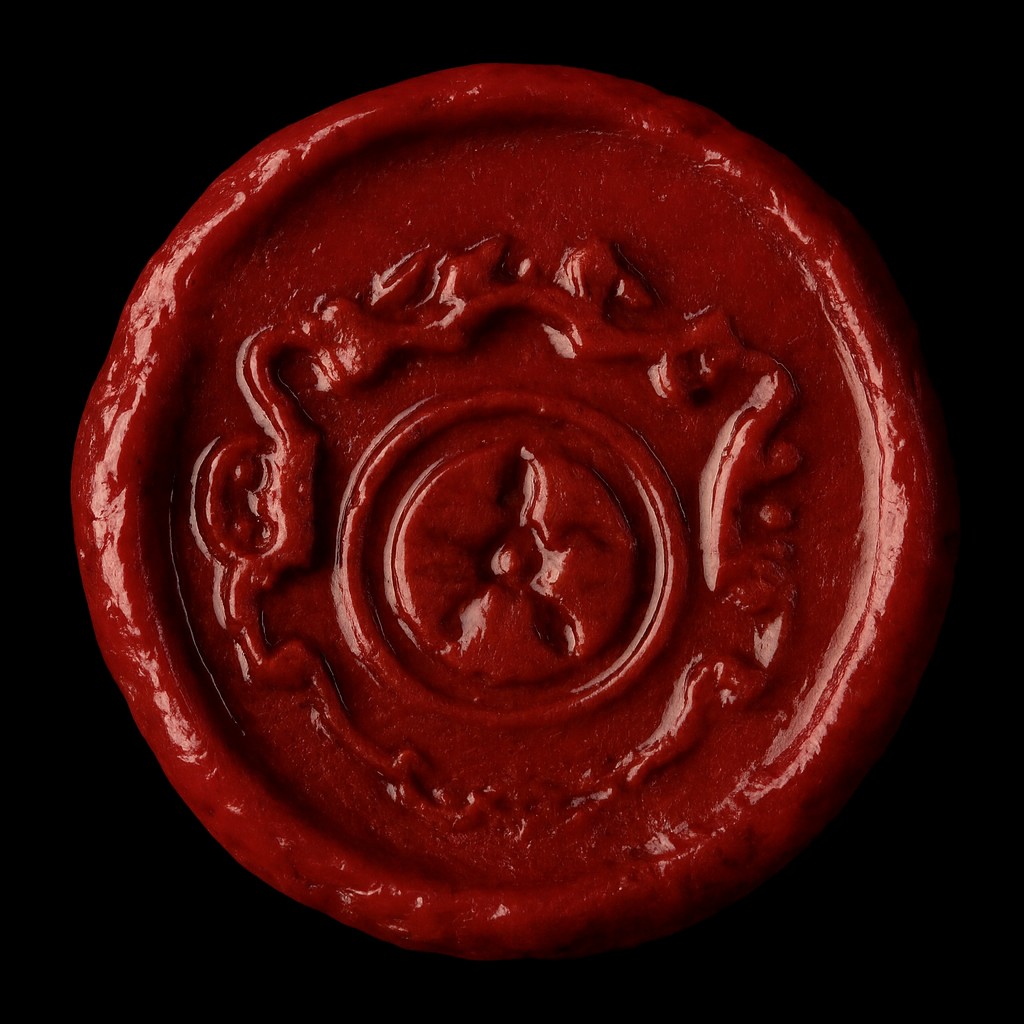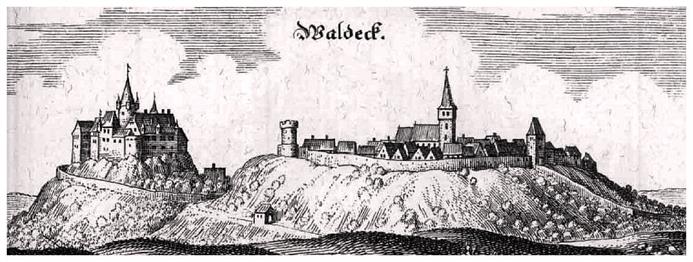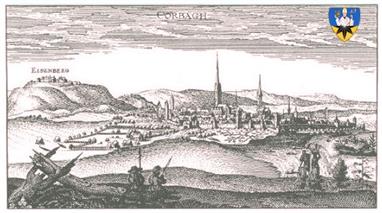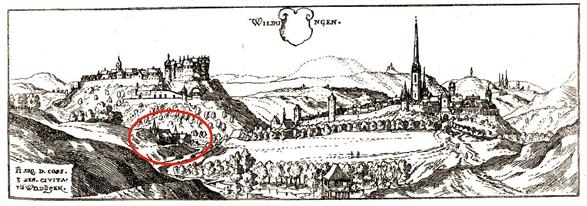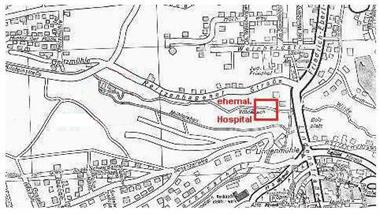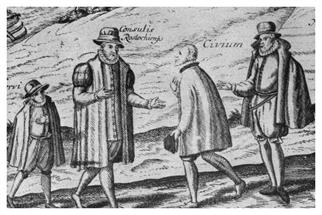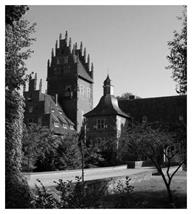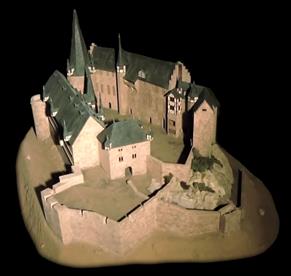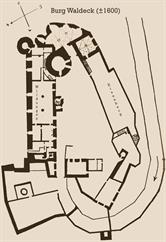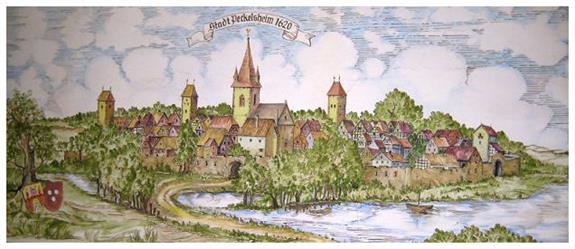

Arnold Langemann was born in 1566 in Mengeringhausen, a part of Bad Arolsen, region of Waldeck, Hessen in Germany. His father is probably Gercke Langemann, a “Vóllspänner”(*) in the close village of Helsen. Arnold attended Wittenberg University, matriculating in 1586. In 1586, Arts Bachelor in Humanities was awarded to Arnold Langemann.
His future brother-in-law, Philipp Nicolai had preceeded him in attending Wittenburg Univeristy a few years earlier. The biography of Pfarrer Phillip Nicolai can be found in many internet web sites. The experiences of Philipp Nicolai most certainly provided Arnold Langemann with a model in which to apply his own future talents in the pursuit of opportunities in service to the counts of Waldeck-Landau line, Waldeck-Eisenberg line and Waldeck-Wildungen line. At some point in his early years Arnold Langemann translated his name in Greek to become Arnold Macrander. (In the German church Latin, his name appears as Arnoldus Macrander).
The uncle of Arnold Langemann (Macrander) was Kanzler (Chancellor) Anton Holmann (*1535-†1606), member of the "Vormundschafliche Regierung" (Interim Government) of Waldeck-Eisenberg, because of the death of Count Franz III of Waldeck-Eisenberg in 1597.
Arnold Langemann (Macrander) served as secretary to Bernhard, count of Waldeck-Landau, Fürstbischof (bishop) of Osnabrück from 1587 to 1591, when the Bishop died following sugery to remove a growth on his leg.
His future brother-in-law, Philipp Nicolai had preceeded him in attending Wittenburg Univeristy a few years earlier. The biography of Pfarrer Phillip Nicolai can be found in many internet web sites. The experiences of Philipp Nicolai most certainly provided Arnold Langemann with a model in which to apply his own future talents in the pursuit of opportunities in service to the counts of Waldeck-Landau line, Waldeck-Eisenberg line and Waldeck-Wildungen line. At some point in his early years Arnold Langemann translated his name in Greek to become Arnold Macrander. (In the German church Latin, his name appears as Arnoldus Macrander).
The uncle of Arnold Langemann (Macrander) was Kanzler (Chancellor) Anton Holmann (*1535-†1606), member of the "Vormundschafliche Regierung" (Interim Government) of Waldeck-Eisenberg, because of the death of Count Franz III of Waldeck-Eisenberg in 1597.
Arnold Langemann (Macrander) served as secretary to Bernhard, count of Waldeck-Landau, Fürstbischof (bishop) of Osnabrück from 1587 to 1591, when the Bishop died following sugery to remove a growth on his leg.
Returning to Waldeck, Arnold became a secretary in Korbach to the court of the counts of Waldeck-Eisenberg line in the period 1591 till 1593. His next assignment was a school rector at Mengeringhausen, Waldeck, near Bad Arolsen for one year.
In the beginning of 1594 Arnold Langemann (Macrander) was employed as councilman in the 'Hochfürstlicher Waldeckischer Rat' of widow countess of Waldeck-Wildungen (according to Prof. Dr. Gerhard Menk † of the "Hessisches Staatsarchiv Marburg": countess Barbara von Hessen, widow of count Daniel von Waldeck-Wildungen) in Alt-Wildungen. According to a source, he was in this period also a secretary and treasurer of the Counts of Waldeck-Wildungen. In 1594 he married Margaretha Nicolai, daughter of Dietrich Theodor Nicolai (a.k.a. Rafflenboel) and Katharina Meyhan and younger sister of Philipp Nicolai. Philipp Nicolai was a Lutheran court preacher, pastor and poet of spiritual songs and also teacher of the Count Wilhelm Ernst von Waldeck (son of widow countess Margaretha von Gleichen-Tonna of the Waldeck-Wildungen line). He was a great defender of the Lutheranism against Catholicism and the Calvinism.
His son Josias attended Giessen University in 1611. Josias married but the wifes surname is not recorded in records from Giessen. His other son Johannes attended Giessen University in 1618 and had a classmate from Wildungen named Johann Ruppel who may have been the son of of Heinrich Ruppel. Johannes Macrander relocated to Garbenheim and Wetzlar on the Lahn. His three wives were Anna Marie Koch, Anna Lorentz, and Anna Schuler. In the book Garbenheim 776-1976 - Ein Heimatbuch (edited by Waldemar Küther, republished by community Garbenheim) a description can be found of the hard live of Johannes Macrander, during (among other things) the 30-year war (1618-1648).
A judge (richter) for Hamm and Rhynern on the Lippe River is mentioned in records for 1603. He participated, at Schloss Heessen, possibly in the interrogation of Else Lindeman (or: Linnemann), accused of witchcraft (sorcery). Confessions in that area of Westphalia were extracted through use of the water probe, done in a witch's pool (or pond). With crossed hands bound to opposite side ankles, the accused either floated or sank. If floating, the person was considered guilty and execution was carried out in due course. Usually a rope was attached to the person in the event of sinking, so that an attempt could be made to pull the person up for air to avoid drowning. One description of these activities is included at the web site http://www.historicum.net in an article "Hexenforschung-E-Texte".
Arnold Langemann is mentioned in footnote [69] of the article. He was associated with Herr von Recke residing at Schloss Heessen. The information was from Archive Boeselager-Höllinghofen, nr. 17: Trial record of the proceedings against Else Lindeman (or: Linnemann) because of sorcery, including transcript of the examiner testimony through Arnold Langemann, Judge to Hamm and Rhynern, 1603. The question was:
Was judge Arnold Langemann in Hamm en Rhynern, Westphalia connected with Arnold Langemann (Macrander) of Waldeck, Hessen who in 1608 was identified as a attorney/counselor in Nieder-Wildungen, Waldeck, Hessen.
Was judge Arnold Langemann in Hamm en Rhynern, Westphalia connected with Arnold Langemann (Macrander) of Waldeck, Hessen who in 1608 was identified as a attorney/counselor in Nieder-Wildungen, Waldeck, Hessen.
Prof. Dr. Gerhard Menk, the researcher at the "Hessisches Staatsarchiv Marburg", suggested that Arnold Langemann (Macrander) may have been practicing law as early as 1600, at the end of his service as councilman of the widow countess of Waldeck-Wildungen and attorney, but the Marburg archives had minimal information for the 1600 to 1608 interval. It is possible, Arnold Langemann (Macrander) could have been assigned on a temporary basis to serve in Westphalia during that time.
But further investigation has revealed that Arnold Langemann (Macrander) was not the judge at the castle of Heessen, but an Arnold Langeschede (also: Langescheid). Although, according to the researchers, the “Findbuch des Heessener Archive" mentioned the name Arnold Langemann. Whether Arnold Langemann (Macrander) was also a judge at the castle of Heessen, is yet unknown.
(* Vóllspänner : The meaning of "Vóllspänner" in German is: "frohnpflichtiger Bauer, welcher ein ganzes Bauerngut besitzt".
An owner of a farmstead with a considerable piece of land, probably about 80 ha (= 200 acres) or more.
"Frohnpflichtig" means that one had to serve his landlord. Mostly a noble man or even a monastery.)
An owner of a farmstead with a considerable piece of land, probably about 80 ha (= 200 acres) or more.
"Frohnpflichtig" means that one had to serve his landlord. Mostly a noble man or even a monastery.)
Arnold Langemann (Macrander) married for a second time. This time with Regina Nübel of Peckelsheim, Westphalia. This marriage produced two children, Johannes (Johann) (08-12-1600) and Elisabeth Macrander (1603). Arnold was next a Procurator (lawyer/attorney) in Nieder-Wildungen. In 1610, he and Regina moved to her home community Peckelsheim (near Paderborn) in Westphalia, where he - perhaps in addition to his work as a procurator - worked as fiscalis (tax representative) of the post Dringenberg until 1612. Arnold died there on 15-03-1620, more because of fighting religion - Catholicism - than age. In the Haus- und Handbuch of Johann Friedrich Macrander the following is written:
As a former employee of the counts of Waldeck and brother-in-law of Philipp Nicolai (all Protestants), Arnold obviously remained a Protestant when he moved to Peckelsheim (region of Paderborn). A Protestant who earned respect by other Protestants, but definitely not by Catholics. Arnold Langemann (Macrander) was in those days in Waldeck a very erudite and influential man, but not in the mainly Catholic Paderborn. This was a completely different area, even though the two territories Waldeck and Paderborn were neighboring areas. Because of this, Arnold was not buried honourably on a cemetery, but as heretic along the streetside outside the city gate. All according the Catholic laws in Paderborn in that timeframe: heretics who died, ought to be buried outside the city gate.
(Castle of Heessen)
(A councilor and a citizen)
(Former Johanniter Hospital between Alt- and Nieder-Wildungen, where also the official residence of Arnold Langemann-Macrander)
Arnold and Margaretha lived in the official residence that was located in the Johanniter Hospital between Alt-Wildungen and Nieder-Wildungen. Their son Josias Macrander was born in 1590. Margaretha died from the plague on 14-02-1597. Because of this event, Philipp Nicolai wrote a letter to his brother-in-law Arnold Langemann (Macrander) and his brothers Johannes and Jeremias Nicolai. In this letter a second, younger son of Arnold and Margaretha is mentioned. Further details about this younger son are unfortunately unknown. It also appeared that Arnold and Margaretha had a daughter. She was married to a certain Petronellus from Lippstadt.
(Waldeck, 1655)



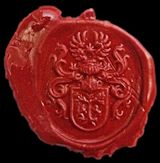


(Signature of Arnold Langemann and his personal seal, from a personal (non-official) letter of 1587. The seal shows a 5-spoke wagon wheel on a so-called renaissance coat of arms. According to the Lower Saxon National Archives, on behalf of the Osnabrück Archbishop's Archives, it is "undoubtedly" the personal seal and not the armorial image of the bishopric Osnabrück. The wax seal itself was unrecognizablely damaged, but the seal was fortunately printed in the paper so it still became recognizable. The original is parchment-colored. Diameter: 1.4 cm.)
“Endlich ist mein Vatter ao 1620 den 15 ten martij zu peckelsheim mehr auß anfechtung der religion als alter in vera fide in Jesum Christum devote gestorben, weil er aber vor seinem ende dem Meßpfaffe nicht beichten wollen, haben Sie ihn auff den Kirchhof nicht wollen begraben lassen, u obschon bey dem Prelaten Zu Paderborn die begräbnuß auff dem Kirchhoff auch mit Zahlung 100 Rthr gebeten, ist ihr Zumahl abgeschlagen, hat ihn also zwischen abend durch etliche leute, ohne Klang v. (= und) gesang v. einig begleitete nachbarn oder nachtbahrinnen vor die Büßerpforte an die Straße begraben müssen, daurauf ein großer grabstein geleget. und als Wir Kinder in der Uberschrifft die ursach dieser schmerzlichen begräbnuß gedencken wollten, ward solches durch den pfaffen verbotten, u mußte der steinmetz nur auff den stein hauen diese wort: Der Erbar Arnoldy Langeman liegt alhir. Bey Ehrliebenden Christen aber ist diese schmeheliche begräbnuß uns seinen hinterlassenen Kindern Keine unehre etc.”
The Johanniter Hospital in the Wilde valley in 1590 (marked in red). This was also the official residence of Arnold Langemann, where his son Johann Langemann (Macrander) was born in 1600. In the background on the left the city of Altwildungen with the castle and on the right the city of Niederwildungen. Today they form the city of Bad Wildungen.
(Korbach, 1655)
(Mengeringhausen, 1655)
.




(Model of the Waldeck castle around 1600)
(Plan of the Waldeck castle. The left wing belonged to the counts of Waldeck-Wildungen, the right wing to the counts of Waldeck-Eisenberg)
- Home
- History
- Origin of the name Macrander
- Origin of the name Langemann
- 1500s: Councilman Arnold Langemann
- 1500s: Magister Josias Macrander
- 1600s: Organ builder Joh. Friedr. Macrander
- 1700s: The first Macranders in the Netherlands
- 1800s: The first Macranders in the USA
- 1900s: The first Macranders in Brazil
- Occupations & Functions 1500s till 1700s
- Family tree
- Coats of Arms
- Images
- Overview
- Documents
- Photos Brazil
- Photos Germany
- Photos Netherlands
- Stephanus Macrander (*1852-†1932)
- > Frans Macrander (*1887-†1962)
- > Bertus Macander (*1889†1967)
- > Gerrit Macrander (*1891-†1986)
- > Louis Macrander (*1893†1964)
- > Theo Macrander (*1895†1962)
- > Wim Macrander (*1897†1974)
- > Anna Macrander (*1899†1994)
- > Dicky Macrander (*1901-†)
- > Stefaan Macrander (*1904-†1974)
- Family announcements etc.
- Photos USA
- John Albert Macrander (*1843-†1921)
- > Charles Oscar Macrander (*1893-†1970)
- >> Gordon Chester Macrander (*1915-†1983)
- John Macrander (*1819-†1910)
- > William Thomas Macrander (*1860-†1923)
- >> Eva Lena Macrander (*1882-†1914)
- >> Maude Olive Macrander (*1885-†)
- >> Bertha Ellen Macrander (*188X-†)
- >> Charles Orville Macrander (*1894-†1978)
- > John David Macrander (*1863-†1951)
- >> Wayne Orle Macrander (*1895-†1954)
- >> Josiah Don Macrander (*1897-†)
- >> Theodore Zed. Macrander (*1902-†1989)
- >> Lawrence Carol Macrander (*1905-†1994)
- > George Oliver Macrander (*1865-†1931)
- >> Zerah Todd Macrander (*1897-†1959)
- Contact
- Guestbook
- News/Links
(Peckelsheim, 1620)

